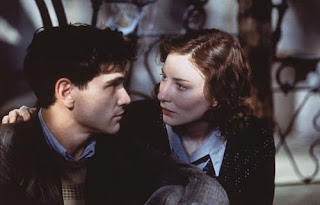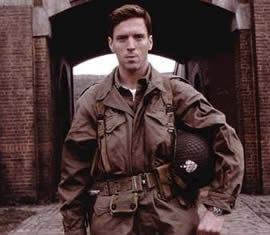Last weekend, my Spouse and I got sucked into watching Band of Brothers, a WWII mini-series starring Damian Lewis and a bunch of other actors who’ll have you pointing at the screen going, “I know that guy! What was he in?”
When I first heard about it, I thought it would be a big hunk of cheese: Produced by Steven Spielberg, augmented by Tom Hanks, fresh on the heels of Saving Private Ryan.
Boy, was I wrong.
The characterization is amazing, the individual soldiers’ stories make the history totally come alive. And you care about these people in a heart-wrenching way. You care about the characters as though you know them personally.
This week, I also saw Charlotte Gray, a movie starring Cate Blanchett and Billy Crudup about a British woman in WWII who goes to France (apparently it was WWII week at Chez Frampton). The acting was good, the story was interesting, but I just didn’t care–because I didn’t care that much about the characters. There wasn’t that moment of connection, as there was in Band of Brothers. And this was true, even though the story was romantic, and Crudup is hawt, and the film has nearly as much war drama as BoB.

So what made the difference? I don’t know, but if I could figure out just an iota of it, I would be selling books by the thousands. When you fell in love with Jane Eyre, or Scarlett O’Hara, or Elizabeth Bennet, was it because of their individual stories? I would guess not; I think it’s because something the author did caused you to connect with the characters in a powerful way.
Many times lately, I’ve put down a book and decided not to finish it because even though the writing was good, and the story had some unresolved questions I might have been interested in finding out the answer to, I just didn’t care about the characters. I didn’t care if they fell in love, or resolved their conflict, or whatever. And this is true even if the writing is fine (I have a few books by fave authors I’ve never finished because of this).
As I am in the process of editing, I am asking myself–many times–‘will someone care about these people? Have I done a good enough job of selling their distinct individuality, their passion, their specialness so readers are compelled to finish?‘
Caring about the characters–or not–is my deal-breaker in terms of reading a book. Do you share that? Do you have other deal-breakers? Which characters have you cared about the most?
Thanks,


Characterization is king… queen… well, the thing that matters most, as far as I’m concerned, and definitely more so for romance.
I can finish the book–if not forgive inconsistencies or language quirks, or other things–if I like the characters.
And I don’t have to love them personally, I have to like them in the sense of seeing them as people–three dimensional, complex, growing through the book.
And this was a great reminder for me to check out Band of Brothers, thank you, Megan!
I understand what you’re saying. I recently finished the third book of a trilogy, and just wanted it done (the first two books had magic elements, which I tolerated, but the third threw in time travel. Wha??). It became more of a school reading assignment than anything else.
I liked Charlotte Grey, but I’ll watch Blanchett in anything (even the heinous Indiana Jones of 2008).
Character is the most important thing for me over plot. think I’ll follow a character I care about practically anywhere and root for him or her all the way. It doesn’t mater if they are good or bad as log as they pull me in. When I don’t care the story just drags.
I think the heart of caring about the story is a character with a problem.
Though Damian Lewis doesn’t hurt, either.
You are definitely right about characterization. There have been books that others have loved and raved about, yet when I read them I did not have the same reaction because the characters did not “speak” to me. The writing may have been fine and the plotting exciting. There may have been no actual flaws I could identify, yet for some reason I felt emotionally distanced from the characters. OTOH, there have been flawed books whose characters jumped right off the page and into my heart.
Given a choice I’ll pick a book that succeeds on every level, but when I look at the books that remain on my bookshelves versus those that get donated to the library’s used book sale, it’s the characters and the emotions they evoke that win every time.
Am sort of brain-dead since I just sent in my new book to the editor (yay! Where’s the wine?), but I agree 100%. Character is the root of good storytelling, no matter the genre, no matter whether it’s a book or movie. The hard thing is, there are no characters that are going to resonate with everyone. I have given friends book I loved only to get a “meh” from them.
But I loved “Band of Brothers” so much (never saw “Charlotte Gray”)…
Megan, I have to disagree with you about Charlotte Gray–sort of–because the character who really resonated with me was Billy Crudup’s father, who was played by that amazing English actor whose name I can’t remember. He was also the old squire in the BBC’s Wives & Daughters.
Janet, waving from the NE conference where I’m eating too much and giving out Riskies buttons
I’ve just been reviewing my Michael Hauge workshop stuff and Hauge would say that you have to give the viewer/reader a reason to identify with the character.
I think you also have to give your characters some source of pain, some reason to root for them to resolve their inner wounds. You have to make them worthy of the happy ending.
Janet:
I really liked Michael Gambon (that’s his name, also the guy from Gosford Park, and a villain in MI-5/Spooks) in CG, but he wasn’t the point of the story, so I didn’t include him in my thinking.
But I do agree, I did like him, and sympathize and empathize with him.
So, yeah, point taken.
Have fun in NE!
I have to agree that characters I care about or am invested in will always make me turn the pages. It is as if I am going on a journey with the characters and I want to see how it ends. There have been some books where I had an equally strong response of loathing or being annoyed by a character and I kept reading to see if they would finally be redeemed. Then when they weren’t I was really ticked!
I want to see that person as human with faults, pain and some divine spark that makes me believe they’re worth fighting for. Without that, I may not finish the book and if I do I won’t buy that author again.
Megan, I had to add BAND to my Netflix list. There are some movie like A Bridge too Far, Manchurian Candidate, The Bridge on the River Kwai, and yes, even Schindler’s List that I found shocking, provoking, and profoundly moving not because of the story content but because of the characters. Photographers know that disasters are more memorable when people can identify them with an expressive face. It was Liam Neeson and Ben Kingsley who made SL memorable, not the actual atrocities.
This is the reason why I don’t like comedies. Tragedy does not make me identify with a character, but the cavalier treatment that most comedies mete out to their characters, does not endear them to me. Notable exceptions being The Gods Must Be Crazy, Laurel & Hardy… I’m not such a pill that I haven’t seen other “good” comedies; I just can’t remember them off-hand. 🙂
Janet, is that actor Michael Gambon? He’s fabulous!!!
CONGRAUTLATIONS, Ammanda!! You’re really working hard and cranking them out.
“This is the reason why I don’t like comedies.”
Keira, I never really thought about it before, but maybe that’s why I don’t care for lots of modern comedy movies. But I do love old ’30s screwball comedies, like “Bringing Up Baby” or “My Man Godfrey”, because the characters are just so lovable. 🙂 (also Shakespeare comedies–the proto-type for doing “funny” while not forgetting fully-rounded and interesting characters!)
I celebrated the end of the book (and forgot that now I have to start the next one) by watching “North and South” last night–the perfect example of being carried along by spectacular characters!